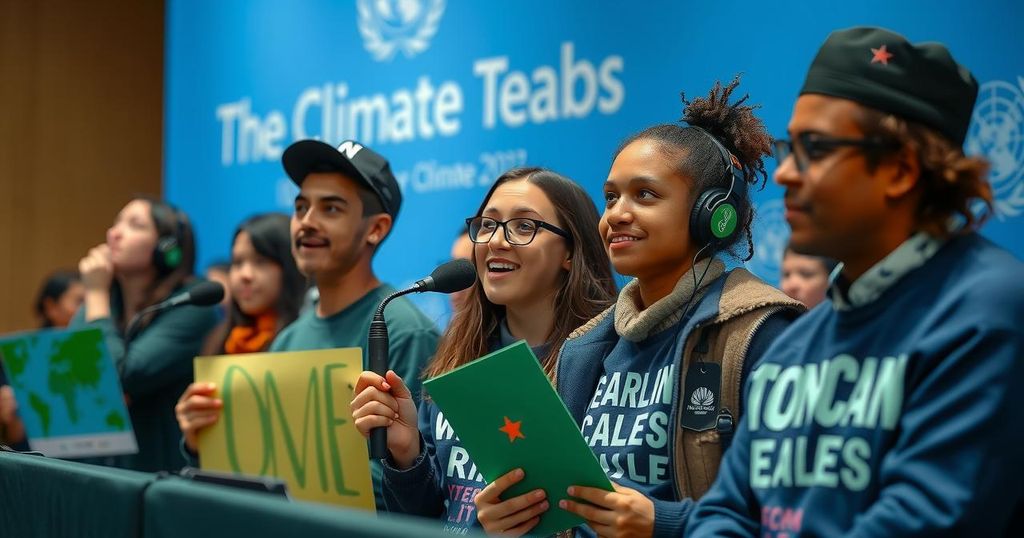Youths at UN Climate Talks: Fighting for Hope Amidst Anger and Loss
Youths at the UN climate talks express anger over climate change impacts, yet maintain hope for future negotiations. Personal experiences of loss and adversity drive their advocacy. Efforts to integrate youth voices into climate policy discussions highlight a necessity for meaningful change. As many face systemic barriers, the urgent need for solidarity and action remains paramount.
Young individuals attending the United Nations climate talks are driven by a profound sense of anger and loss. Many have faced devastating personal consequences due to climate change, such as losing family members, homes, and educational opportunities. Despite this turmoil, a flicker of hope remains alive among these youth. Marinel Ubaldo, a 27-year-old climate activist from the Philippines, embodies this sentiment, reflecting on her past as a youth affected by catastrophic typhoons. “It has become so tiring for me to be just a poster child,” she remarked, emphasizing the persistent struggles faced by young people in the climate arena. Attending COP29 marks her sixth attempt to influence negotiations that will shape her future. While young activists are passionate about enacting change, the climate summit is marred by reduced attendance from key leaders and restrictive environments in authoritarian host nations. This year’s conference, similar to preceding ones, has witnessed tightened control over protests, leaving youths to grapple with the challenges of representation and advocacy. Felipe Paullier from the UN youth office highlighted the necessity of integrating youth perspectives into decision-making processes. Further compounding these issues, UNICEF’s Kitty van der Heijden stressed that climate change drastically affects children, who are already facing adversity linked to health and nutrition. Their growing bodies are especially susceptible to heat and other extremes caused by climate change. Despite their fatigue and uncertainty regarding the impact of their voices, young activists feel an urgent responsibility to speak out. For young individuals from climate-vulnerable regions, such as Fathimath Raaia Shareef from the Maldives, the urgency to advocate for their future is paramount, an obligation rooted in personal experiences with loss and anxiety about climate-induced displacement. As a seasoned participant in COP discussions, Francisco Vera Manzanares from Colombia highlighted the importance of meaningful advocacy. He noted the dichotomy between being heard and truly listened to, underscoring the urgent need for adult allies in their struggle. “It is our right. It is our future. It is our present,” he asserted, emphasizing the imperative nature of children’s voices in the climate dialogue. In summation, the engagement of youth at the UN climate talks is marked by a complex interplay of anger, hope, and responsibility. They continue to call for meaningful recognition and action amid feelings of despair over the slow advances in climate policy—reiterating that the future rests precariously in their hands.
The attendance of young delegates at the UN climate talks underscores a critical intersection between climate change and future generations. Many youths have personally experienced the adverse effects of climate change, compelling them to advocate for necessary reforms and to secure a sustainable future. The ongoing discussions tackle themes of political engagement, representation of marginalized voices, and the societal implications of climate policy decisions. This backdrop fuels young activists’ determination to be actively involved in climate negotiations, despite facing systemic barriers that hinder their participation and impact.
The voices of youth at the UN climate talks reveal a deep-seated anger coupled with a tenacious spirit of hope. The challenges they encounter serve as a testament to the urgent need for genuine representation within climate dialogues. As these young individuals push for change, their call for solidarity with adults in advocating for their rights emerges as an essential factor in the global struggle against climate change. Ultimately, their determination to influence policy ensures that the narrative of climate action remains firmly entrenched in the realities of those most affected.
Original Source: www.voanews.com




Post Comment